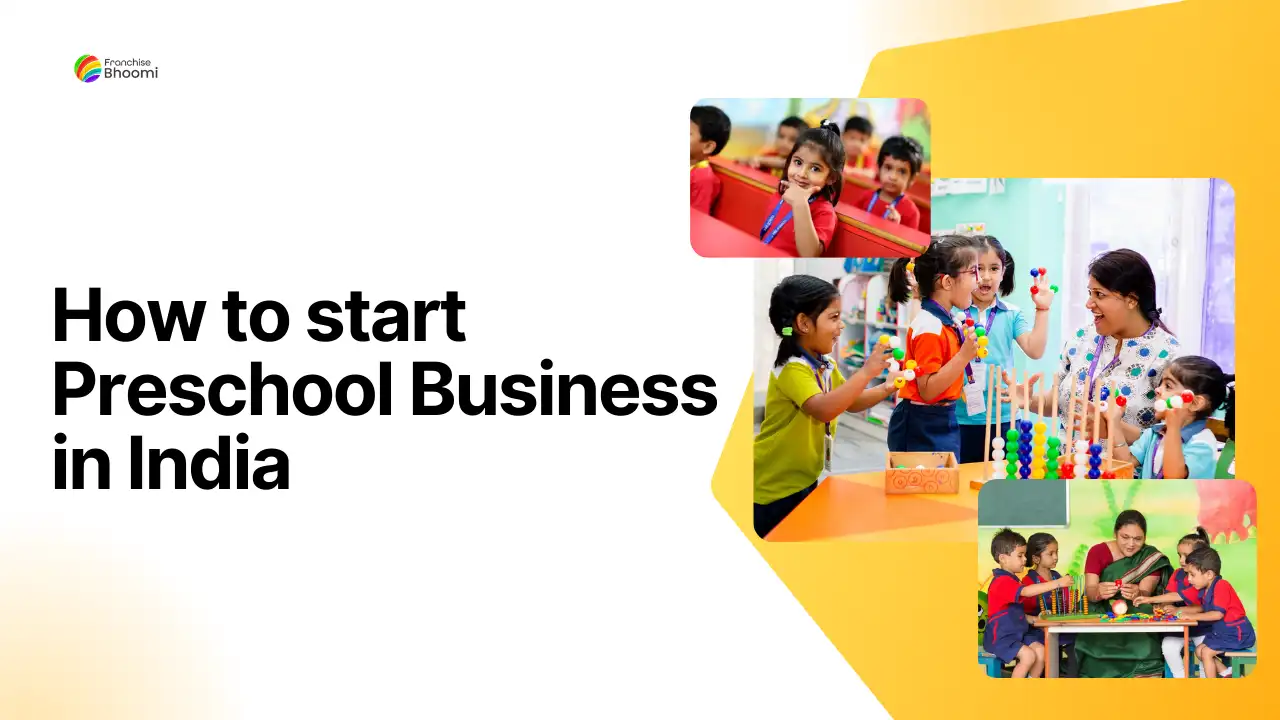Are you interested in starting a preschool business in India? With education being a priority for Indian parents, opening a pre-school can be a rewarding and profitable venture. In this guide, we’ll walk you through everything you need to know on how to start a preschool business, from planning and investment to marketing and day-to-day operations.
Let’s make this journey simple and clear, so you can begin with confidence;
Why Start a PreSchool Business?
India has a booming demand for preschools. Parents today value early learning, which has created a thriving market for preschool businesses. Plus, this business gives you the opportunity to make a positive impact on children’s lives while earning a steady income.
Understanding the Demand for PreSchools in India
In India, early education has become crucial as parents recognize its role in their child’s development. The growing demand for quality early education and child care is opening up many opportunities in the pre-school business sector. Starting a pre-school business can not only help fulfill this demand but also create a positive impact in your community. With the right approach, you can build a successful and sustainable business.
Why Start a PreSchool Business?
A preschool business offers several benefits:
- Growing Market: The demand for quality pre-school education continues to increase.
- Impactful Work: You’ll be contributing to the early development of children.
- Low Investment Options: Some pre-school models offer low-cost setups and quick returns.
If you’re interested in education and enjoy working with children, the pre-school business can be a meaningful venture.
How to Start a PreSchool Business: Step-by-Step Guide
1. Research the PreSchool Industry
To start a pre-school business, you first need to understand the industry. Research different types of pre-schools, such as Montessori, Waldorf, and Reggio Emilia, and decide which approach you’d like to take. Visit existing pre-schools in your area to learn more about their setup, environment, and teaching methods.
2. Select the Right Location
Location is critical when starting a preschool business. Look for areas with a growing population, residential communities, or neighborhoods with families. A location with minimal traffic, a secure environment, and proximity to residential areas is ideal for a pre-school.
3. Fulfill Legal Requirements
To start a preschool business legally in India, you will need to:
- Register Your Business: Decide on the business structure (sole proprietorship, partnership, etc.), and register it.
- Obtain Licenses and Permits: These may include land-use permits, health and safety clearances, and fire safety certification.
- Adhere to Educational Regulations: Make sure you comply with local education board regulations and obtain the necessary approvals.
Get loan upto 20lakhs for Women business owners
Costs to Start a PreSchool Business in India
The investment required to start a preschool business depends on factors like location, size, and infrastructure. Here’s a rough estimate:
- Rent or Property Purchase: ₹2,00,000 to ₹5,00,000 per year.
- Infrastructure and Furniture: ₹3,00,000 to ₹6,00,000.
- Staff Salaries: ₹1,50,000 to ₹3,00,000 per year.
- Marketing and Miscellaneous: ₹50,000 to ₹1,00,000.
Total investment: Around ₹7,00,000 to ₹15,00,000.
Some franchise brands may also have a royalty fee or monthly percentage, so be sure to include this in your budget if you’re going the franchise route.
Pro Tip: If you’re looking for franchise opportunities in the pre-school industry, visit FranchiseBhoomi for expert guidance and support.
PreSchool Franchise vs. Independent PreSchool
If you’re wondering how to start a preschool business with minimal risk, a franchise can be a good option. Many established pre-school brands offer franchise opportunities, which include a pre-set curriculum, training, and ongoing support. However, an independent pre-school offers you more flexibility and control over your curriculum and brand image.
Top Pre-school franchise lists
How Much Can You Earn?
The preschool business can generate significant profits. On average, pre-schools charge ₹25,000 to ₹60,000 per child annually. If you enroll 50 kids, your revenue could range from ₹12,50,000 to ₹30,00,000 per year. After covering expenses, you can expect a profit margin of 25-30%.
Here are examples of typical fees charged by preschools in India based on their location, facilities, and reputation:
Budget Pre-Schools (Small Localities)
Average Annual Fee per Child: ₹27,500.
Enrollment: 50 children.
Total Revenue: ₹13,75,000.
Expenses: ₹8,50,000 (Staff Salaries, Rent and Utilities, marketing, Supplies & Maintenance)
Profit: ₹5,25,000 per year.
Profit Margin: 38-40%.
Mid-Range Pre-Schools (Tier-1 & Tier-2 Cities)
Average Annual Fee per Child: ₹65,000.
Enrollment: 70 children.
Total Revenue: ₹45,50,000.
Expenses: ₹21,50,000. (Staff Salaries, Rent and Utilities, marketing, Supplies & Maintenance)
Profit: ₹24,00,000 per year.
Profit Margin: 50-53%.
By carefully managing expenses and delivering quality education, you can ensure steady growth and profits in the pre-school business.
Monitor Your Financials
Starting a preschool business requires investment in infrastructure, curriculum, staff salaries, and marketing. It’s important to keep track of your expenses and income to ensure profitability.
- Set fees: Determine the fee structure for your preschool. Keep in mind the location, facilities, and competition in your area. Ensure the fees are reasonable yet sustainable for your business.
- Calculate your investment: Your investment will include rent, furniture, staff salaries, teaching materials, and more. Keep track of all expenses to understand your cash flow.
Create a Marketing Plan
Once your preschool is ready, you need to spread the word. A strong marketing plan will help you attract parents and students. Here’s how you can do that:
- Build a website: Create a simple website that outlines your preschool’s services, curriculum, and facilities.
- Social media: Use social media platforms like Facebook, Instagram, and WhatsApp to connect with potential customers. Share pictures and videos of your preschool activities.
- Word of mouth: Encourage satisfied parents to refer your preschool to their friends and family.
- Local advertising: Distribute flyers, posters, and brochures in nearby neighborhoods to raise awareness.
Focus on Customer Service
Providing excellent customer service is vital to the success of your preschool. Maintain strong communication with parents, address their concerns, and keep them updated on their child’s progress. Happy parents are more likely to recommend your preschool to others.
Tips for Running a Successful PreSchool Business
- Build a Strong Reputation: Focus on delivering quality early education and building a positive reputation.
- Prioritize Safety: Ensure a safe and secure environment for all children.
- Continuous Improvement: Regularly update your curriculum and methods to keep up with trends in early childhood education.
- Stay Connected with Parents: Keep parents involved by updating them on their child’s progress and creating a strong parent-teacher network.
Final Thoughts on How to Start a PreSchool Business
Starting a preschool business in India is an exciting opportunity. By following these steps, you can create a successful venture that not only generates profits but also contributes to the development of young minds. Whether you start from scratch or opt for a franchise, remember to focus on quality and build trust with parents.
If you’re ready to take the plunge, start planning today! And if you’re looking for expert guidance or franchise opportunities, check out FranchiseBhoomi to get started.
Good luck with your pre-school journey! 😊
Have more questions? Drop us a message on FranchiseBhoomi, and we’ll guide you every step of the way!
Frequently Asked Questions (FAQ) How to start PreSchool Business in India
Both options have their advantages:
Independent Pre-School: Offers flexibility and complete control but requires more effort in curriculum design and branding.
Franchise: Provides brand recognition, pre-designed curriculums, and marketing support but requires a franchise fee and adherence to the brand’s rules.
To attract parents, use:
Social media platforms like Facebook and Instagram.
Local advertisements (flyers, posters, and banners).
Open-house events to showcase your facilities.
Word-of-mouth referrals from satisfied parents.
Fees depend on your target audience and facilities:
Budget Pre-Schools: ₹1,500 to ₹3,000 per month.
Mid-Range Pre-Schools: ₹3,500 to ₹7,000 per month.
Premium Pre-Schools: ₹8,000 to ₹12,000 per month.
While pre-schools are privately run, some government schemes and educational policies may offer support for infrastructure or teacher training.
Franchise Bhoomi connects investors with trusted franchise opportunities and provides expert guidance for starting and running your pre-school business. We also help with loans, market research, and branding strategies
The number of students required depends on your operational costs and fee structure:
Budget Pre-Schools: Around 30-40 students.
Mid-Range Pre-Schools: Around 50-60 students.
Premium Pre-Schools: Around 70-100 students.
Yes, you’ll need:
A Trade License from local authorities.
Basic compliance with Right to Education (RTE) norms.
Additional permissions for safety, such as fire and hygiene certificates, may also be required.
Yes, pre-school businesses can be highly profitable. Depending on your scale and fees:
Profit margins range from 38-55%.
Estimated annual profits can vary between ₹5,00,000 and ₹65,00,000.
The investment depends on the type of pre-school you want to open:
Budget Pre-Schools: ₹7,00,000 to ₹10,00,000
Mid-Range Pre-Schools: ₹15,00,000 to ₹25,00,000
Premium Pre-Schools: ₹30,00,000 to ₹50,00,000





Pingback: Zara Franchise - How to start, Investment, Profit, Royalty Fee
What a fantastic resource for anyone looking to start a preschool! This blog post breaks down all the essential steps, from setting up to marketing, in such an easy-to-understand way.
Pingback: Adhira & Appa Franchise - How to Start, Franchise Investment, ROI